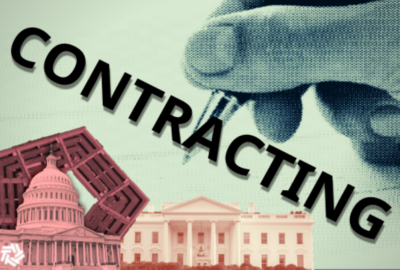Contractors can be forgiven if they’re grumpy this month
As another continuing resolution looms, agencies are in limbo as they consider starting new projects. Then you have some unfortunate protest rulings. No wonder...
As another continuing resolution looms, agencies are in limbo as they consider starting new projects. Then you have some unfortunate protest rulings. No wonder federal contractors are nervous about calendar-year 2024. For one take on the the situation, the Federal Drive with Tom Temin spoke with federal sales and marketing consultant Larry Allen.
Interview Transcript:
Tom Temin And Larry, it looks like there’s sort of weird news everywhere you look. But I wanted to start with something a little bit arcane. There was, as you’re writing about compliance, three recent developments companies need to know to stay on the right side of the ledger, including when low price can get you into trouble. Let’s give the thumbnails of what’s going on there.
Larry Allen So, Tom, these are three recent decisions that all came out of various judicial enclaves. And I think it’s they are things that contractors need to know about. First up, we talk so much about low price, technically acceptable in the federal government today. A lot of contractors can come away with the sometimes-false impression that low price rules always and everywhere. And yet there was a recent case that showed that a company actually bid an unrealistically low amount for a potential project. Now, Tom, I’ve been in this business for a while, and this is certainly not the first time that I’ve seen this, but that’s an important reminder because we actually don’t see it that often. If you’re a government contractor in your bidding on a project, you have to bid a reasonable price and you have to bid competitively. But that doesn’t mean that you try to buy the business by coming in so low that the government just rejects your bid out of hand, because they know from previous experience that they’re not going to be able to rely on people to provide labor in critical areas unless that laborers compensated at a certain level. And that was what was really at the core here. The second issue that I’m talking about this week has to do with whether or not your confidential information is actually confidential, and this is something that is really front of mind and should be for a lot of government contractors, specifically Tom talking here about a federal district court judge. So, judge that doesn’t normally deal day to day with government contract issues. He made a ruling on a Freedom of Information Act request. The Department of Labor had originally withheld information on over a thousand companies. Equal Employment Opportunity reports their summary report, citing confidentiality and important company information. Well, the petitioner for the Freedom of Information Act request went back and appealed that decision in federal court, and the court sided with the petitioner. As a result, the Equal Employment Opportunity Information from over a thousand companies is going to be released and released to Who? Well, in this case, Tom, it’s going to be a fellow member of the Fourth Estate from where you are. So, contractors may expect to see that, you know, they’re reporting on their goals on this important government area, may be out in the open for, others to see their competitors to see or would be interesting.
Tom Temin Yeah. And it always pays to venue shop when you’re in court because you can get different results depending on where you go. And your third issue has to do with firm fixed price contracts that can really sink you.
Larry Allen Tom. That’s in firm fixed price contracting has been looked at, particularly in the government, as the highest good, the one to aim for and government acquisition, because that way everybody understands what the parameters are. Well, yes and no. Tom, if you’re a government contractor, you have to always remember that firm fixed price bids come with inherent risk for you. As the contractor, you have to be very sure that the government’s got the statement of worked out correctly and that you, as the company, understand the scope of work before you bid that firm fixed price offer. And a lot of companies understand that in the government and bid accordingly, they give themselves a little wiggle room, if you will, and appropriately so. But however, the extreme case that I’m talking about here that should be of interest to everybody is Boeing, and their tanker deal. Right now, the company has lost over $2 billion, $2 billion. It’s not recoverable. And as they say in Joel James Bond movies, Tom, it’s $2 billion and counting. And that’s a lot of money even if you’re Boeing. So that’s a wakeup call to contractors that you should really understand what the risks are. And if you’re not sure about what the parameters are, have those discussions with the client before you sign on the dotted line.
Tom Temin And let’s hope those tanker doors stay shut. We’re speaking with Larry Allen, president of Allen Federal Business Partners, and I wanted to ask you about, your take on we’ve been watching the Congress. And as Mitchell Miller reported here yesterday, there were some moves. Over last weekend, where maybe we’re moving toward a CR of indeterminate length and the really confusing situation. And if a CR were to go through March, that’s essentially half the fiscal year. And contractors have got to be just not happy about this any more than their agency customers are.
Larry Allen Tom, I think that’s fair to say. This is really no way to run a government. You know, we have been hoping to see appropriated bills for FY 24 in December. Certainly, February was not unrealistic to expect. Now we’re being told that will either be, I think, March 1st or March 8th or 9th before we get all of the bills together. And if you listen to Tom Cole over on the House side, he’s kind of hinting that they may even need a longer time to read through all 12 appropriations bills on their side of Congress. So, I think that’s something that should be of concern to everybody. Uh, it does not set up, uh, the government or contractors for a very good, uh, FY 24. You know, at best, you know, if Congress does pass these bills in March, it will be, you know, early to mid-April time before each, uh, individual federal office gets its final number for the remaining months of the fiscal year. And then we’re really going to see, uh, tremendous amount of activity and churn. And, you know, what happens when anybody has less than half of the amount of time needed to do the job, right? Uh, you’re going to have mistaken made. You’re going to have things that need to get done that don’t quite get done. You’re going to have a lot of missed opportunities, a lot of missed opportunities in government business. Uh, a lot of and when you’re talking about funding critical government programs and moving forward, it’s not just, oh, gee, you know, we didn’t get to go to the Taylor Swift concert. It’s something that’s going to have a little bit more national impact than that. Uh, sorry to all the Swifties out there who listened to your show, but, you know, there are some priorities out there that, uh, may not get done. And that’s real issue. And then, of course, we’ll have the oversight hearings, uh, next year on why that happened. Nobody really is going to say, but they should. Well, Congressman, if you’d pass the bills on time, this might not have happened.
Tom Temin Yeah. What we can expect if there are appropriations at the March deadline. Again, we don’t know what it is yet. That’s going to mean very busy contracting officers, the COs The 1102s get a lot of work dumped on them late in the year. And for vendors, it becomes a matter of finding a contracting officer that has the capacity to take on what it is you need for your program to buy.
Larry Allen Well, that’s right. I think we’re going to be seeing, uh, two things, Tom. First, every bit of work that can be done on a project up until the actual execution of the RFP or RFQ is going to be done. So if you’re waiting for the funds to come out as a contractor before you talk to your agency, you’re going to be way behind the curve, because I think a number of federal agencies are going to have projects that are to borrow an older phrase, shovel ready, uh, to get going the second they get the appropriations in their accounts. Uh, that’s where we’re also going to see, as you know, just accelerated use of assisted acquisition services. There are only so many contracting officers in government to go around. And we’ve seen already the assisted acquisition operations in the General Services Administration, the Department of Interior, and even over at NIH all increase in popularity before this happened. Every person with a government contracting warrant is going to be busy from probably the middle of April to September 30th.
Copyright © 2025 Federal News Network. All rights reserved. This website is not intended for users located within the European Economic Area.
Tom Temin is host of the Federal Drive and has been providing insight on federal technology and management issues for more than 30 years.
Follow @tteminWFED






